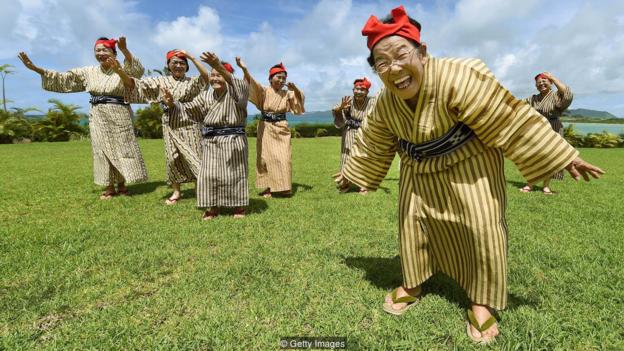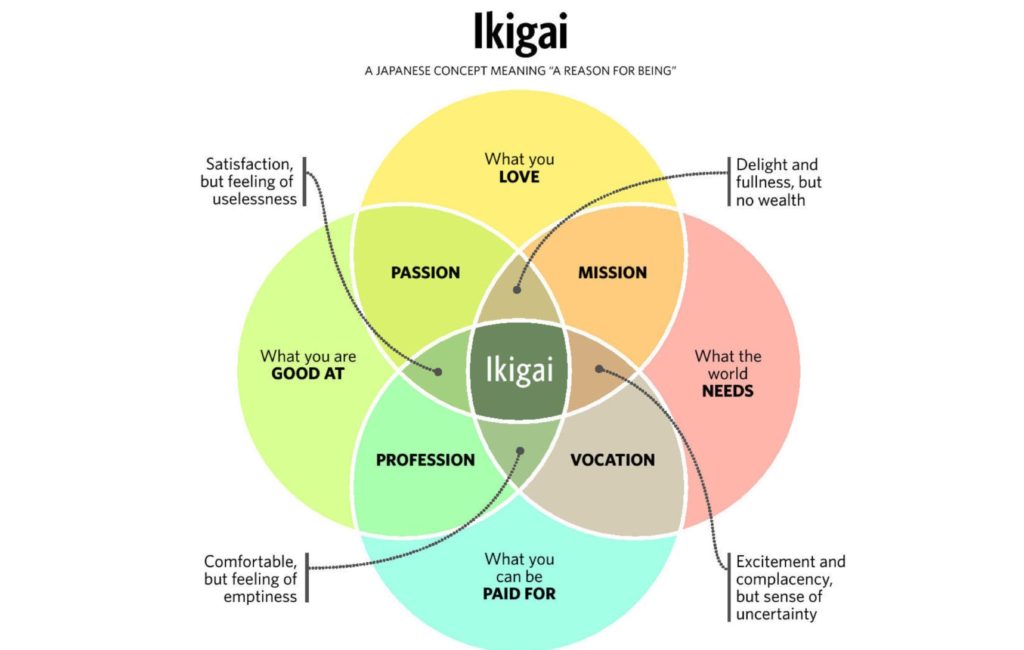Ikigai, “A Reason of Being”
Ralph Waldo Emerson said, “To be yourself in a world that is constantly trying to make you something else is the greatest accomplishment.”
 With over 1,000 centenarians, Okinawa has earned a reputation as a "land of the immortals" and is one of five "Blue Zones," areas around the world in which people live much longer than average.
With over 1,000 centenarians, Okinawa has earned a reputation as a "land of the immortals" and is one of five "Blue Zones," areas around the world in which people live much longer than average.
So what's the secret? Experts argue that through a combination of good genes and healthy lifestyle help, there's no specific formula.
Ikigai* (生き甲斐, pronounced [Ike ee guy) is a Japanese term for "a reason for being." The word 'Ikigai' usually refers to the source of value in one's life or the things that make one's life worthwhile. *According to Akihiro Hasegawa, the origin of the word ikigai goes back to the Heian period (794 to 1185).
The term ikigai compounds two Japanese words: iki (
In the culture of Okinawa, ikigai is thought of as "a reason to get up in the morning"; that is, a reason to enjoy life. In a TED Talk, Dan Buettner suggested ikigai as one of the reasons people in the area had such long lives.
The word ikigai usually is used to indicate the source of value in one's life or the things that make one's life worthwhile. Secondly, the word is used to refer to mental and spiritual circumstances under which individuals feel that their lives are valuable. It's not linked to one's financial status[6]. Even if a person feels that the present is dark, but they have a goal in mind, they may feel ikigai. Behaviors that make one feel ikigai are not actions one is forced to take—these are natural and spontaneous actions.
In the article named Ikigai — jibun no kanosei, kaikasaseru katei ("Ikigai: the process of allowing the self's possibilities to blossom") Kobayashi Tsukasa says that "people can feel real ikigai only when, on the basis of personal maturity, the satisfaction of various desires, love, and happiness, encounters with others, and a sense of the value of life, they proceed toward self-realization.
Ikigai is about feeling your work makes a difference in people’s lives.
According to Japanese culture, your ikigai lies at the center of four interconnecting circles. It is seen as the convergence of four primary elements:
 Discovering your own ikigai is said to bring fulfillment, happiness and make you live longer.
Discovering your own ikigai is said to bring fulfillment, happiness and make you live longer.
Want to find your Ikigai? Ask yourself the following four questions:
Mission: What you love
Vocation: What the world needs
Profession: What you can get paid for
Passion: What you’re good at
Each of these elements helps contribute to your happiness; all four are crucial to your “reason for being”. As we all know, your personal happiness relies on much more than simply having a career (Vocation) and getting a paycheck (Profession). Likewise, Mission and Passion aren’t enough to sustain you financially if you don’t know how to turn it into a paying job.
In their book Ikigai The Japanese Secret to a Long and Happy Life, Hector Garcia and Francesc Miralles break down the ten rules that can help anyone find their own ikigai.
1. Stay active and don’t retire
2. Leave urgency behind and adopt a slower pace of life
3. Only eat until you are 80 percent full
4. Surround yourself with good friends
5. Get in shape through daily, gentle exercise
6. Smile and acknowledge people around you
7. Reconnect with nature
8. Give thanks to anything that brightens our day and makes us feel alive.
9. Live in the moment
10. Follow your ikigai
Fulfillment is fast becoming the main priority for most of us. Millions of people still struggle to find what they are meant to do. What excites them. What makes them lose the sense of time. What brings out the best in them.
“Our intuition and curiosity are very powerful internal compasses to help us connect with our ikigai,” Hector Garcia and Francesc Miralles write.
The elderly pop band KBG84 with centenarian members
Source: CNN, Wikipedia, mediums/ thrive-global, good.co / blog, Getty Images






